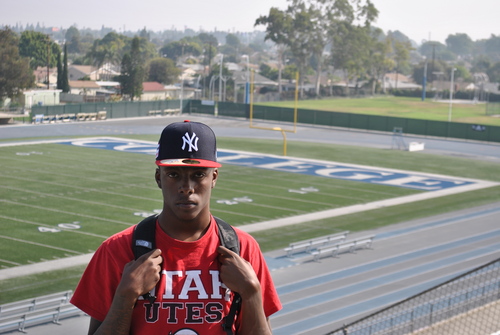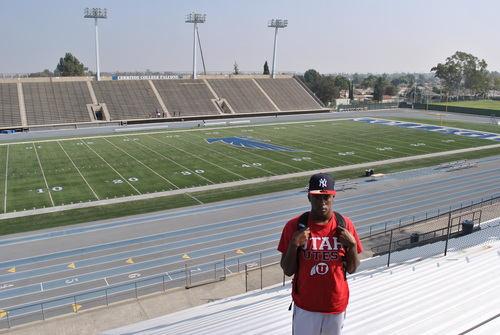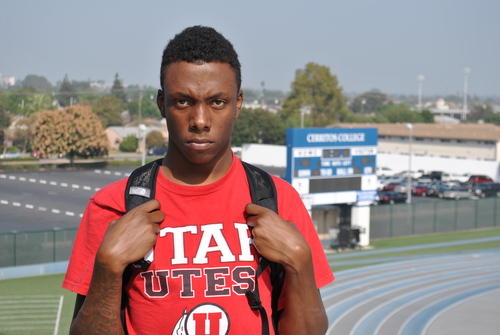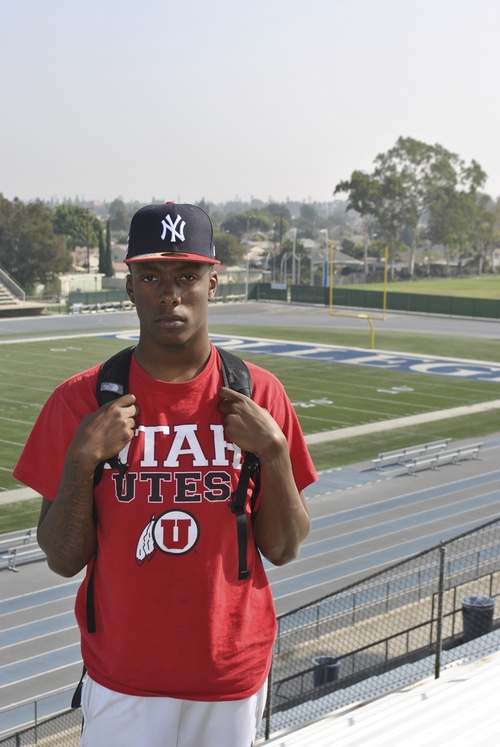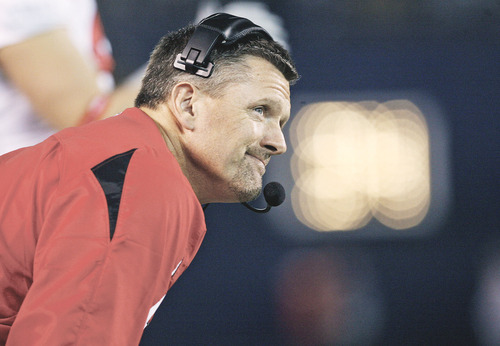This is an archived article that was published on sltrib.com in 2013, and information in the article may be outdated. It is provided only for personal research purposes and may not be reprinted.
Norwalk, Calif. • Not two months after his release from the University of Utah football team, he crumpled onto a Compton street corner as two fresh gunshot wounds began a deep smolder.
One bullet had passed straight through. It would be more than a month before doctors could remove the other from his lower abdomen.
But when they don't kill you, gunshots eventually heal. There's no scar tissue for the pain that Alphonso Marsh feels when he turns on the TV at his cousin's house and watches the Utes take the field without him.
A lithe 6-foot-2 cornerback whom coaches are seemingly obligated to refer to as "prototypical," Marsh fears he will become one of the handful of signees in most Division I recruiting classes who will not only never play a down, but never make it to their second season with the team.
Marsh was a true freshman last fall when he forfeited his scholarship at the U. He says he left to help his struggling mom and dying grandmother; his former high school coach suspects he was homesick; he heard rumors that he was too dumb, too street, or just not good enough. Whatever the reason, as soon as Marsh was released he again became a potential recruit, and NCAA regulations prohibit his former team from even publicly acknowledging that he still exists.
Even when that, in and of itself, is quite a story.
—
California love • Salt Lake City is separated from Los Angeles by little more than dust and rocks, yet some in Marsh's high school circle had never heard of it.
In the buildup to signing his letter of intent on local TV, friends of the Dominguez High School standout were sure he'd join fellow Dons cornerback Brandon Beaver at the University of Washington in Seattle. Marsh says Beaver even grabbed him in the halls and begged him not to sign with Utah.
It was too late. On his official visit in January, Marsh fell hard for the mountain majesty — "That was my first time being in snow," he says — and then-defensive line coach Chad Kauha'aha'a (now with Wisconsin) convinced his family that no other school cared as much about the teen's well-being.
"It's a great situation for [inner-city recruits] when they get up here and get into an environment that is markedly different from what they are used to," says Utah head coach Kyle Whittingham. "In a way, it's a breath of fresh air for them."
Although crime has declined in Compton since N.W.A. popularized it as America's murder capital in the late '80s, the violence still lives up to its ugly reputation. In 2012, the FBI reported 21 cases of murder and nonnegligent manslaughter in the L.A. suburb of roughly 98,000 — 17 times Utah's rate.
Compton and neighboring cities are just as flush with future Division I athletes, and Dominguez High's list of distinguished alumni includes one of the best defensive backs in the NFL, Seattle Seahawks Pro Bowler Richard Sherman, as well as 10 other Pac-12 cornerbacks.
But for every Richard Sherman, thousands are left to wonder "What if?"
—
Out of Compton • There is no way to know what Alphonso Marsh is like on the streets of Compton, or why somebody tried to kill him.
Sitting in the football field bleachers at sleepy Cerritos College, where he's a redshirt sophomore working on his associate degree so he can sign with a Division I team in spring 2015, Marsh is polite and looks you in the eye when he talks. The eager 19-year-old frequently describes the male figures in his life as "like a big brother" or "like a father."
The youngest of Curley Rachal's four children, Alphonso Marsh Jr. was born and raised in Compton, and that's where the consistency in his life ends. His last memory of his father until recently was, at age 6, watching him beat his mother. Marsh Sr. was hauled off and convicted of spousal abuse, and Marsh's mom and grandmother — both named Curley Rachal — took turns being dad.
"Boo," as they called him, was "active, vibrant, but quiet at times," says his mother, who worked nights at Bank of America. When Marsh wasn't shooting hoops, he'd play with his toy cars at home.
His childhood was short-lived.
Marsh was convicted of assault with a deadly weapon and battery in seventh grade after he and five friends were hazing a younger student and broke his nose. He spent six months in a correctional camp. Then, when he was in ninth grade, one of his closest friends, Travion Johnson, was shot and killed in nearby Willowbrook.
Dominguez varsity coach Keith Donerson watched Marsh play on the jayvee team in 10th grade and thought Marsh had the talent to work his way into a more stable life. But Marsh wasn't easily convinced.
"He was walking the fence," Donerson says. "He wasn't on the football side, he wasn't on the gang side. But with us, you have to make a choice."
Marsh's star rose in 7-on-7 camps before his junior season, Donerson says, and when his older teammates began to boast about their official visits, he bought in. He tore his ACL, MCL and PCL the summer before his senior season, but he'd made enough of an impression that a handful of Pac-12 schools were still interested.
His grandmother — "She was more like another mother, because she raised him, too," his mom says — suffered from chronic lupus and demanded reassurances from Donerson throughout Marsh's recruitment. Will they feed Alphonso? Will they house Alphonso? Will they help Alphonso graduate?
"She wanted to make sure he was taken care of," Donerson says. "I think she knew she was going to die."
—
SLC or bust • The Curley Rachals cried tears of joy when Marsh left for Utah with North Long Beach wide receiver and childhood Pop Warner rival Delshawn McClellon, and that's where the fairy tale ends.
Just days before fall camp, Marsh was playing Electronic Arts' NCAA '13 with McClellon and fellow freshman corner Justin Thomas when he got sick to his stomach.
"I was throwing up, throwing up, throwing up," he says. His teammates joked that it was the cafeteria food, but Marsh was scared enough to ask junior defensive back Keith McGill for a ride to the hospital. McGill "kind of knew what was wrong with me," Marsh says, "but he didn't want to tell me."
His appendix had burst. Gone were any hopes of playing as a true freshman. It took Marsh a month to recover, and when he looked in the mirror he saw that the extra muscle mass he'd spent the summer building had vanished.
Back home, his mother had been laid off and was struggling to find work. He called her almost every day. Above all, it seems, Marsh was just plain lonely in Salt Lake City.
"That was a culture shock for Alphonso," Donerson says. "A lot of these kids, I know it's a bad environment here, but it's still home. When they get outside that environment and they go through adversity, they come home."
Donerson tried to reach out but Marsh didn't want to hear it. He went back to Compton the week Utah played UCLA at the Rose Bowl, and he asked the team for his release.
Whittingham says most inner-city athletes have positive experiences at the U. and that breakups like Marsh's are due largely to bad luck. "The players that come out of there, a lot of them are looking for a change," he said. "It's a big responsibility and one that we embrace as a staff."
Marsh's exploits at Utah were limited to his practices after the appendectomy. On one play, he says he broke off a blitz to intercept a quick out to senior DeVonte Christopher. At parties, he says teammates would introduce him to fans and say, "This is going to be the future of the Utes." "Everybody was like, he's really a big-time [player]," Marsh says.
—
Back to Cali • One day during Marsh's junior year of high school, he was walking to the house of his cousin, Eastern Washington cornerback Diamonte Wiggins, when a car pulled up next to him. A gang member demanded to know where he was from — code for "who are you with?"
Marsh said he wasn't in a gang. They told him to pull down his hood, he did, and the mood vastly improved.
"They were like 'Oh, you Alphonso, huh? You're that football player. Just put on for the city. I'm proud of you.'"
But his reputation took a big hit when he came back from Salt Lake City. Everyone was suddenly an expert on why he didn't cut it at Utah, and everyone suddenly knew all along it would be so.
He also didn't have a home. His first three months back he stayed with a former teammate from park league basketball, Dorrell Slaughter, who lent him some clothes when he saw that all Marsh had were sweat pants and a couple pairs of jeans .
"He's got a good heart," Slaughter says. "He tried to help out around the house and stuff because he knew he [couldn't pay me back], money-wise."
Marsh enrolled and played right away at West Los Angeles College, where he says coaches moved him around the field and insulted him with the notion that he might beef up and play defensive end.
Then, on Nov. 31, he hit bedrock.
It was a rainy night and Marsh says he was walking to a car with two friends when another car circled the block and stopped at a nearby corner. A man got out and fired twice. Marsh started to run, but he'd been hit by both shots and fell to the pavement. Seven more "pops" rang out rapidly overhead.
A friend rushed Marsh to the hospital, at which point life became a blur.
He had the final bullet removed in January. In February, his grandmother died.
—
Restarting from the bottom • "Junior college, that's the last resort," Donerson says. "Especially being a defensive back ... they have 15 or 20 guys fighting for that position. But somebody like Alphonso, he's going to jump to the head of the pack."
Junior college is a tough route because a former Division I signee has to get an associate degree to return to the top level, and he has to do it fast. "Bounce-backs" like Marsh need to pass two college-level English classes and college algebra among 48 transferable credits in a year and a half to graduate in December and be eligible for spring ball — a veritable must for junior transfers like Marsh with no redshirt year remaining.
Marsh says his classes are no sweat, except for English. He is still hampered by his high school knee injury, and he walks gingerly. But Cerritos defensive coordinator Tom Caine, agrees that he won't have a tough time seeing the field next year.
"He's got great size for a defensive back," Caine says. "There's a million 5-8 corners; there's only so many 6-2 corners."
In August, Marsh's mother surprised him with a phone number for his father.
He called it, and when his dad said "Hello," he was silent for about 5 seconds. Senior repeated, "Hello?" "I said, 'Hello, this is Alphonso,' and he [misinterpreting it as a question] said, 'Yeah, may I ask who's calling?' and I said, 'This is your son. Alphonso Marsh Jr."
It was his father's turn to be quiet for a beat, then shout for joy. They met up at a hospice where he's currently being treated for an unknown illness, and father and son shared a hug for the first time in 13 years. It was something less than forgiveness, but it gave the younger Marsh a sense of closure.
The threat of gun violence continues to loom, however.
In May, his longtime friend Michael Grim Jr. was killed down the street from the house Marsh grew up in. Marsh inherited Grim's number as a junior at Dominguez and looked up to the Metro Rail worker as a role model, another "big brother."
Just before fall semester began at Cerritos, Marsh and a friend had just pulled up to a house when they heard shots from a party around the corner. Marsh ducked behind a car. One person was killed.
If he can get healthy, get his associate degree, improve his technique and, above all, stay alive, Marsh says Utah coach Aaron Roderick told him the weekend of the USC game that he'll have a spot at Utah. Because of NCAA regulations, Roderick, Whittingham, Kauha'aha'a, McClellon, McGill, Thomas and Beaver were all unable to comment about Marsh at this time.
Marsh clings to that hope, speaking and tweeting as though he's already back on the team — eyes on the prize.
"I tell him, instead of looking at the negative points, always look at the positive parts," Rachal says. "It's bad now, but it will turn around sooner or later."
mpiper@sltrib.comTwitter: @matthew_piper


